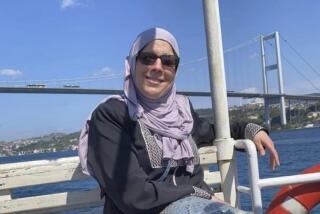Moussaoui Says Judge ‘Undermining’ Case
- Share via
ALEXANDRIA, Va. — ALEXANDRIA, Va. -- As authorities pared down the case against suspected “20th hijacker” Zacarias Moussaoui, a defiant Moussaoui on Tuesday challenged the authority of the U.S. judicial system to put him on trial for terrorism in a case he deemed “nonsense.”
“You are just preparing me for the gas chamber. That is what you are doing,” Moussaoui told a federal judge.
U.S. District Judge Leonie Brinkema gave Moussaoui some leeway to lodge his angry grievances, but she grew impatient and said his claims would be best taken up at his trial, which is due to start Sept. 30. She rejected several motions from Moussaoui, including his demand that the trial be moved to Colorado because he says the Sept. 11 attack on the nearby Pentagon has biased potential jurors in the area against him.
Moussaoui’s latest courtroom outburst came in his first appearance as his own defense attorney, during his arraignment on a new capital indictment returned against him last week by a grand jury in Northern Virginia.
Brinkema read Moussaoui several dozen changes made in the document’s legal language since the initial indictment was returned against him in December. The six charges, all involving conspiracy to commit terrorism in concert with the Sept. 11 hijackers, remain unchanged, and most of the other revisions involved slight changes in wording, dates or dollar amounts.
But the new indictment secured by the U.S. attorney’s office also deletes several references to crop-dusters, including Moussaoui’s alleged interest in starting a crop-dusting company while living in Oklahoma and a computer disc with information on crop-dusting applications found in his possession in Minneapolis after his arrest last August.
Authorities last year considered the material to be an important part of their investigation, and the discovery of Moussaoui’s interest in crop-dusting prompted the FBI last fall to warn law enforcement officials that terrorists might be planning to use the agricultural planes to wage chemical attacks.
With the deletion of the crop-dusting references, “it would appear that [prosecutors] don’t intend to bring that up as an overt act,” said Alan H. Yamamoto, appointed by the court to act as a “stand-by” counsel to assist in Moussaoui’s defense.
Prosecutors refused to discuss why the grand jury eliminated the crop-dusting allegations from the indictment, but the move suggests they intend to limit their case against Moussaoui to what happened on Sept. 11 rather than on more speculative evidence about what else he and other suspected terrorists may have been planning.
Although Moussaoui was in jail in Minnesota on Sept. 11 on an immigration charge, authorities allege that he was supposed to be the 20th hijacker. They maintain that his activities, including his suspicious behavior at a flight training school and his receipt of a $14,000 wire transfer from a suspected terrorist, mirrored those of the 19 hijackers. He is the only person charged in the United States in connection with the attacks.
Moussaoui has not tried to hide his hatred for the United States and for Jews around the world, saying he has prayed for their destruction. But he continued to insist Tuesday that he “had nothing to do with Sept. 11” and he says government officials, who he claims have had him under surveillance for years, know that.
Moussaoui, facing the death penalty if convicted, refused to enter a plea to the new indictment against him because he said he did not recognize the authority of the court. “I have nothing to say to the United States.... You are not here to represent me,” he told the judge, accusing her of using “every trick on the books” to thwart his defense.
At one point, Moussaoui indicated he wanted to plead nolo contendere, or no contest, but the judge told him that he did not appear to understand that such a plea could be tantamount to a guilty plea. Despite his objections, Brinkema entered a not guilty plea on his behalf.
Moussaoui, who has refused to speak with Yamamoto since the court picked the Virginia lawyer to assist in the defense, charged that Brinkema was “interfering” with his defense by not allowing him to pick his own legal advisor. He wants to use a Muslim attorney from Houston, Charles Freeman, but Brinkema has balked at the move because Freeman is not licensed to practice in Virginia.
“You are undermining my position, my ability to defend myself,” Moussaoui said. “This is unbelievable.”
Freeman, dressed in a traditional Muslim robe and skullcap, sat quietly in the back of the courtroom and did not participate in the proceeding. He told reporters he had “absolutely nothing to say,” and he refused to comment on Brinkema’s charge that he violated federal court rules by assisting Moussaoui with two recent motions even though he was not officially his attorney.
Brinkema also refused to give Moussaoui access to the addresses of witnesses because she said they could be at risk. That move, too, incensed Moussaoui because he said he would be unable to interview witnesses in preparing his defense.
“You are just putting me in my cell and running the show. I have no meaningful way to defend myself. It is a parody,” he told the judge. “This is nonsense.”
More to Read
Sign up for Essential California
The most important California stories and recommendations in your inbox every morning.
You may occasionally receive promotional content from the Los Angeles Times.










